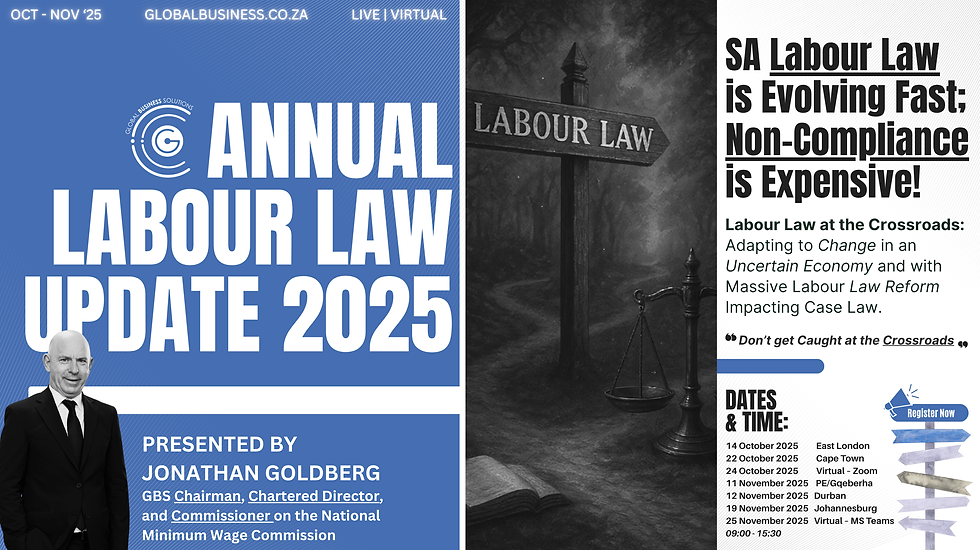Foster Parents and Surrogate Mothers: Do They Qualify for Parental Leave Under Van Wyk?
- John Botha

- Nov 27, 2025
- 3 min read

The Constitutional Court's landmark judgment in Van Wyk has brought welcome clarity to parental leave entitlements, but it has also raised important questions about who qualifies as a "parent" for these purposes. Two particular scenarios deserve careful consideration: foster parents and surrogate mothers.
The Van Wyk Test
The Van Wyk judgment established that to qualify for parental leave under the Basic Conditions of Employment Act (BCEA), a person must have "assumed parental rights and responsibilities over the child as contemplated in the Children's Act." The Court interpreted this to mean full parental status—such as biological, adoptive, or commissioning parents in surrogacy arrangements—not temporary caregivers like foster parents.
Foster Parents: Caregivers, Not Parents
Despite the critical role foster parents play in children's lives, the Children's Act, 2005 (Act No. 38 of 2005) makes a clear distinction between foster parents and those with full parental rights:
Foster parents are explicitly recognized as "care-givers" under section 1 of the Act
Their rights and responsibilities focus on day-to-day care, upbringing, and development
They do not have full parental rights such as guardianship or legal parent status
Foster care arrangements are temporary, time-limited, and subject to periodic court review
Foster parents must comply with social worker supervision and intervention plans
Given this limited legal status, foster parents do not automatically qualify for BCEA parental leave under the Van Wyk interpretation. They have not "assumed parental rights and responsibilities" in the full sense required by the judgment—they are temporary caregivers operating under court supervision, not parents with comprehensive legal rights over the child.
Surrogate Mothers: Gestational Carriers, Not Legal Parents
The position of surrogate mothers under the Children's Act is even more clearly defined:
Section 297 provides that any child born through a valid, High Court-confirmed surrogacy agreement is "considered the child of the commissioning parent(s) from the moment of birth."
The Act establishes that:
The surrogate mother is legally obliged to hand over the child after birth
She (and her spouse or partner) has no parental rights or responsibilities regarding the child unless the agreement is terminated within 60 days and she is also the genetic mother
The surrogate mother may only have contact rights if specifically provided for in the agreement
She does not have parental status under the Children's Act
Her role is limited to gestation and birth—all parental rights transfer to the commissioning parents upon birth
This provides clear legal certainty: surrogate mothers would not qualify for parental leave under the Van Wyk test, as they have not assumed parental rights and responsibilities. The commissioning parents, however, would qualify, as they hold full parental status from the moment of birth.
The Need for Legislative Reform?
While the legal position is relatively clear, it raises policy questions about whether the current framework adequately supports modern family arrangements. Foster parents often care for children for extended periods and face significant demands when a child is first placed with them. Similarly, the distinctions around surrogacy, while legally sound, may not reflect the practical realities of all parties involved.
These are matters that may require legislative attention to ensure that leave entitlements align with the diverse ways South African families are formed and structured.
Join us at the Annual Labour Law Update. This year's theme is Labour Law at the Crossroads: Adapting to Change in an Uncertain Economy and with Massive Labour Law Reform Impacting Case Law. What you'll gain:
Master the Digital Transformation of Labour Law in 2025
200+ Labour Law Cases Unpacked by Jonathan Goldberg
Critical Updates on Upcoming Legislation & NEDLAC Amendments
Navigate Workplace Challenges from the Digital Era to Discrimination Laws

View our upcoming events: Upcoming Events and Qualifications, like AI Compass Capacitation Programme 2026, Employment Equity Reporting, Annual Employment Conference 2026, Managing Absenteeism in the Workplace, Advanced Occupational Certificate: HRM Officer (NQF 6), and Advanced Occupational Certificate: HRM Officer (NQF 6).
*All workshops are offered as customised in-house training that can be presented virtually or on-site.
"Global Business Solutions (GBS)—Your Partner in Strategic HR Compliance"




Comments